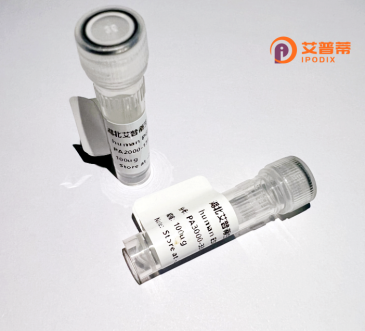
| 纯度 | >90%SDS-PAGE. |
| 种属 | Human |
| 靶点 | POLS |
| Uniprot No | Q5XG87 |
| 内毒素 | < 0.01EU/μg |
| 表达宿主 | E.coli |
| 表达区间 | 1-542 aa |
| 活性数据 | MSPCPEEAAMRREVVKRIETVVKDLWPTADVQIFGSFSTGLYLPTSDIDLVVFGKWERPPLQLLEQALRKHNVAEPCSIKVLDKATVPIIKLTDQETEVKVDISFNMETGVRAAEFIKNYMKKYSLLPYLILVLKQFLLQRDLNEVFTGGISSYSLILMAISFLQLHPRIDARRADENLGMLLVEFFELYGRNFNYLKTGIRIKEGGAYIAKEEIMKAMTSGYRPSMLCIEDPLLPGNDVGRSSYGAMQVKQVFDYAYIVLSHAVSPLARSYPNRDAESTLGRIIKVTQEVIDYRRWIKEKWGSKAHPSPGMDSRIKIKERIATCNGEQTQNREPESPYGQRLTLSLSSPQLLSSGSSASSVSSLSGSDVDSDTPPCTTPSVYQFSLQAPAPLMAGLPTALPMPSGKPQPTTSRTLIMTTNNQTRFTIPPPTLGVAPVPCRQAGVEGTASLKAVHHMSSPAIPSASPNPLSSPHLYHKQHNGMKLSMKGSHGHTQGGGYSSVGSGGVRPPVGNRGHHQYNRTGWRRKKHTHTRDSLPVSLSR |
| 分子量 | 86.3 kDa |
| 蛋白标签 | GST-tag at N-terminal |
| 缓冲液 | PBS, pH7.4, containing 0.01% SKL, 1mM DTT, 5% Trehalose and Proclin300. |
| 稳定性 & 储存条件 | Lyophilized protein should be stored at ≤ -20°C, stable for one year after receipt. Reconstituted protein solution can be stored at 2-8°C for 2-7 days. Aliquots of reconstituted samples are stable at ≤ -20°C for 3 months. |
| 复溶 | Always centrifuge tubes before opening.Do not mix by vortex or pipetting. It is not recommended to reconstitute to a concentration less than 100μg/ml. Dissolve the lyophilized protein in distilled water. Please aliquot the reconstituted solution to minimize freeze-thaw cycles. |
以下是关于重组人DNA聚合酶(假设POLS为DNA聚合酶相关,可能存在拼写误差)的参考文献示例:
---
1. **文献名称**:*"Recombinant human DNA polymerase η: Expression, purification, and functional characterization"*
**作者**:Masutani, C., et al.
**摘要**:研究重组人DNA聚合酶η的体外表达与纯化,揭示其在紫外线诱导的DNA损伤修复中的跨损伤合成功能。
2. **文献名称**:*"Purification and biochemical properties of recombinant human DNA polymerase θ (POLQ)"*
**作者**:Seki, M., et al.
**摘要**:描述POLQ的重组表达及酶学特性,阐明其在双链断裂修复中的微同源介导末端连接机制。
3. **文献名称**:*"Structural insights into recombinant human DNA polymerase λ fidelity and substrate specificity"*
**作者**:García-Díaz, M., et al.
**摘要**:解析重组人POLλ的晶体结构,分析其催化活性与DNA合成的保真度差异。
4. **文献名称**:*"Functional analysis of recombinant human POLβ variants in base excision repair"*
**作者**:Beard, W.A., et al.
**摘要**:通过重组POLβ突变体研究其在碱基切除修复中的作用,探讨酶活性与癌症关联性。
---
**备注**:若“POLS”特指非DNA聚合酶类别,建议确认术语准确性。以上文献基于假设POLS为DNA聚合酶相关名称(如POLQ/θ、POLη/λ/β等)列举,实际研究方向需结合具体背景调整。
**Background of Recombinant Human POLS Protein**
Recombinant human POLS (DNA polymerase sigma) protein is a synthesized version of the naturally occurring enzyme encoded by the *POLS* gene in humans. As a member of the DNA polymerase family, POLS is implicated in DNA replication and repair processes, particularly in filling short gaps during DNA synthesis or repair. Unlike replicative DNA polymerases, POLS is classified as a low-fidelity polymerase, often involved in translesion synthesis (TLS), a mechanism that allows DNA replication to bypass damage-induced stalls, albeit with a higher error rate.
Produced via recombinant DNA technology, the POLS protein is typically expressed in microbial (e.g., *E. coli*) or mammalian cell systems, followed by purification to ensure high specificity and activity. This engineered approach enables large-scale production for research and therapeutic applications. Studies focus on its role in maintaining genome stability, cancer biology (where dysregulated TLS contributes to mutagenesis), and responses to chemotherapy. Additionally, recombinant POLS serves as a tool to investigate DNA damage tolerance mechanisms and develop inhibitors targeting error-prone polymerases in oncology. Its structural and functional characterization continues to advance understanding of DNA repair pathways and their implications in disease.
×